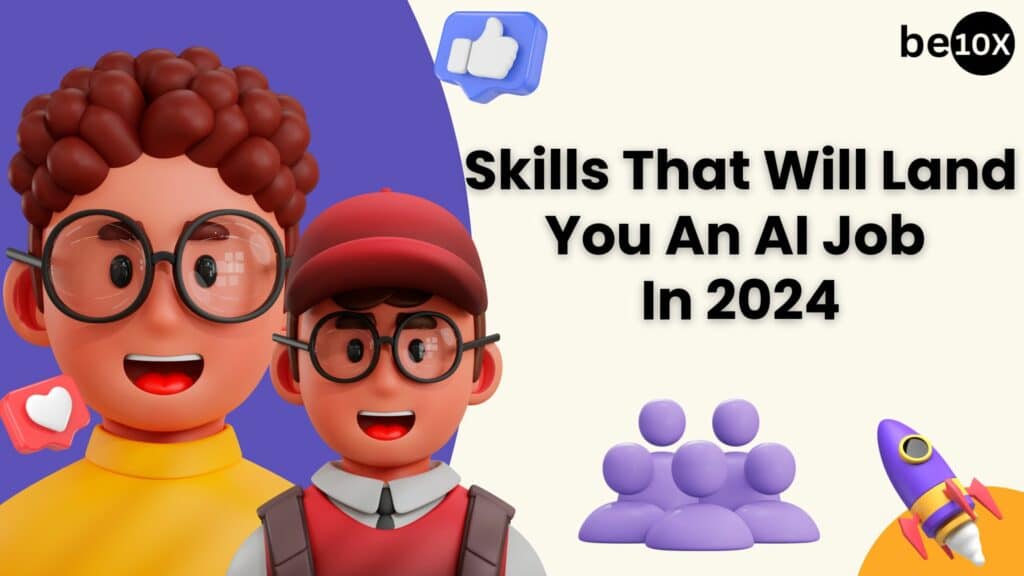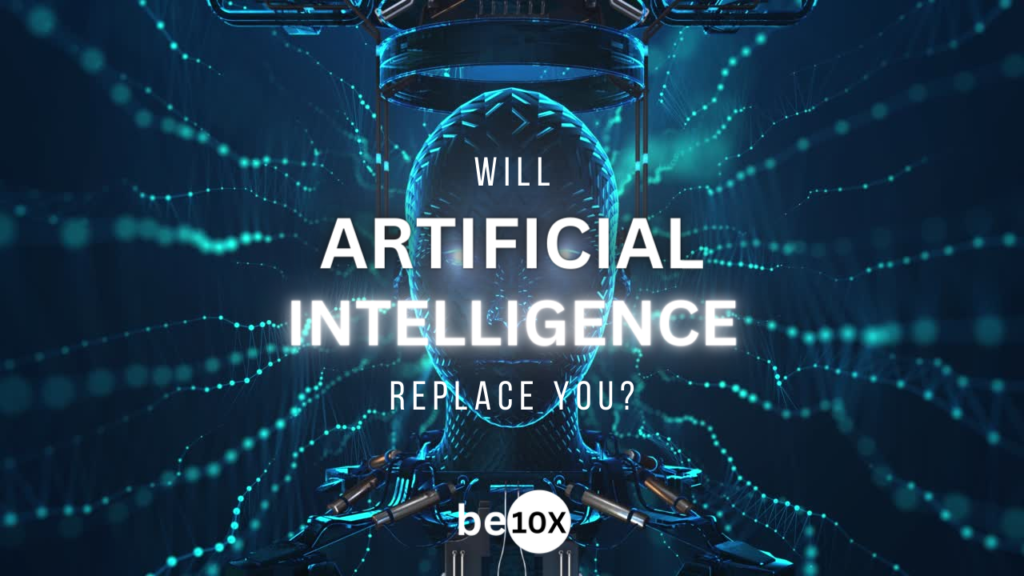The need for skilled workers in the Artificial Intelligence (AI) industry is growing at a rate that is unparalleled. For anyone hoping to work in artificial intelligence (AI) in 2024, keeping up with the most recent skills is essential in this age of rapid technological breakthroughs. The article covers the fundamental and advanced skills required to succeed in the ever-changing field of artificial intelligence jobs.
The applications of AI in industries ranging from finance to healthcare are growing at a rapid pace. With companies embracing AI to improve decision-making and automate procedures, there is an increasing demand for skilled workers.
Further, as per Mckinsey report on Generative AI and the Future of work in America, generative AI could automate around 30% of hours currently worked across the economy of the United States by the year 2030.
Earn money with artificial intelligence by enrolling in an AI workshop by Be10x.
Table of Contents
Importance of Staying Updated on Skills for AI Jobs
Technology is changing quickly, and the AI industry is no different. It is essential to stay up to date with the most recent tools, techniques, and approaches in order to maintain your competitive edge and value in the job market.
Employers are looking for someone with a diverse skill set in 2024. The capacity to solve issues in the real world and apply principles of artificial intelligence across fields is highly praised. Let’s explore the essential abilities that will make you stand out in the AI employment field.
8 Skills That Will Land You an AI Job In 2024
Here are the skills that will help you land an AI Job in 2024:
- Programming Languages
- Mathematics and Statistics
- Machine Learning Skills
- Natural Language Processing Skills
- AI framework and tools
- Big Data and Cloud Computing
- Soft Skills
- Prompt Engineering

Programming Languages
Programming languages provide the foundation for comprehending and applying advanced AI principles. These core abilities are essential for negotiating the complexity of AI development, regardless of experience level in the industry.
You can learn programming languages such as:
- Python
Python remains the undisputed champion in the AI realm. Its simplicity, readability, and extensive libraries, such as NumPy and Pandas, make it the go-to language for AI development. Proficiency in Python is not just an advantage but a prerequisite for any AI professional.
- R
R, with its statistical capabilities, is a powerful tool for data analysis and visualization. Understanding R enhances your ability to interpret data, a fundamental skill in the AI workflow.
- Julia
Julia’s high-performance computing capabilities make it a rising star in AI development. While not as ubiquitous as Python, its potential for numerical computing tasks positions it as a language worth mastering for AI enthusiasts.
Mathematics and Statistics
Mathematics and statistics play a pivotal role in AI by providing the mathematical foundation for modeling, optimization, and decision-making. From linear algebra to calculus, and probability to statistics, these disciplines empower AI professionals to create robust models and derive meaningful insights from data.
- Linear Algebra
A solid grasp of linear algebra is fundamental for understanding the operations within machine learning models. Concepts like matrices, vectors, and eigenvalues are the building blocks of many AI algorithms.
- Calculus
Calculus comes into play when optimizing models. Gradient descent, a fundamental optimization algorithm in AI, relies on calculus principles. Proficiency in calculus is essential for tweaking models to achieve optimal performance.
- Probability and Statistics
Probability and statistics form the backbone of AI decision-making. From Bayesian reasoning to hypothesis testing, these concepts guide the development and evaluation of AI models.
Machine Learning Skills
At its core, machine learning is about developing algorithms that allow computers to learn and improve from experience. Rather than relying on explicit programming, ML systems use data to identify patterns, make predictions, and adapt their behavior over time.
Here are the detailed skill set you need to learn:
- Regression
Regression models predict numerical values and are vital in scenarios where predicting a continuous outcome is necessary.
- Classification
Classification models categorize data into predefined classes, forming the basis for various AI applications.
- Clustering
Clustering algorithms group similar data points together, revealing patterns and structures within the data.
- Dimensionality Reduction
Reducing the number of features in a dataset enhances model efficiency and simplifies interpretation.
- Neural Networks
Understanding the architecture and functioning of neural networks is fundamental to grasping deep learning principles.
Natural Language Processing (NLP) Skills
In an era where digital communication and data-driven insights are paramount, NLP skills play a crucial role. From understanding user intent in chatbots to extracting valuable information from vast amounts of text data, NLP empowers AI systems to interact with human language in a meaningful and intelligent way.
Here are some of the natural language processing skills you need to earn in 2024:
- Transformer Architecture
The Transformer architecture, revolutionizing NLP, is the backbone of models like GPT-3 and BERT.
- BERT (Bidirectional Encoder Representations from Transformers)
BERT, a pre-trained language model, excels in understanding context and nuances in language.
- Sentiment Analysis
Analyzing sentiment in text data is crucial for understanding user opinions and feedback.
- Named Entity Recognition (NER)
NER involves identifying and classifying entities (e.g., names, locations) in text data.
- Text Generation
Text generation models, like OpenAI’s GPT-3, have applications in content creation and creative writing.
AI Frameworks and Tools
AI frameworks and tools serve as the technological backbone that enables developers and data scientists to build, train, and deploy artificial intelligence models efficiently. In this exploration of AI frameworks and tools, we will delve into the essential components that empower innovation in the dynamic field of artificial intelligence.
Here are some of the best AI Framework and Tools to learn in 2024:
- TensorFlow
TensorFlow, developed by Google, stands as one of the most popular and versatile AI frameworks. Its flexibility allows developers to build and deploy machine learning models across a variety of platforms, from mobile devices to cloud servers. TensorFlow’s extensive ecosystem supports a wide range of applications, including image recognition, natural language processing, and reinforcement learning.
- PyTorch
PyTorch, developed by Facebook, has gained popularity for its dynamic computational graph and intuitive interface. PyTorch’s flexibility is particularly advantageous for researchers and developers experimenting with novel architectures. Its dynamic graph allows for easy debugging and model exploration.
- Scikit-learn
Scikit-learn is a powerful and user-friendly library for machine learning in Python. It provides a simple and consistent interface for a variety of machine-learning algorithms, making it an ideal choice for beginners and experienced practitioners alike. Scikit-learn covers a broad spectrum of tasks, including classification, regression, clustering, and dimensionality reduction.
- Keras
Keras is an open-source deep-learning library that serves as an interface for building neural networks. Known for its user-friendly API and modularity, Keras allows developers to quickly prototype and experiment with deep learning models. Keras seamlessly integrates with TensorFlow, making it a popular choice for building neural networks.
- Microsoft Cognitive Toolkit
The Microsoft Cognitive Toolkit, or CNTK, is a deep learning framework developed by Microsoft. CNTK is recognized for its scalability and compatibility, supporting both Windows and Linux environments. It provides efficient implementations of popular deep learning algorithms and is particularly suitable for large-scale distributed training.
Learn more about AI tools.
Get enrolled in the Be10x artificial intelligence online course for beginners and learn AI tools.
Big Data and Cloud Computing
Big Data and Cloud Computing are two intertwined technologies that have revolutionized the way organizations store, process, and derive insights from vast amounts of data. Let us now see some of the best big data and cloud computing skills to learn in 2024:
- Handling Large Datasets
Proficiency in managing and processing large datasets is essential for AI applications.
- Distributed Computing
Understanding distributed computing frameworks like Apache Hadoop facilitates parallel processing of data.
- Cloud Platforms
Familiarity with cloud platforms such as AWS, Azure, and Google Cloud enables scalable and flexible AI solutions.
- Data Preprocessing
Cleaning and transforming raw data into a usable format is a critical step in the AI development pipeline.
- Data Cleaning
Identifying and rectifying errors in datasets ensures the accuracy and reliability of AI models.
Soft Skills
To become job ready, you must learn various soft skills such as:
- Communication Skills
Effective communication is essential for collaborating with interdisciplinary teams and conveying complex AI concepts to non-technical stakeholders.
- Problem-Solving Abilities
The ability to analyze complex problems and devise innovative solutions is invaluable in AI development.
- Adaptability and Continuous Learning
Given the rapid evolution of AI, being adaptable and committed to continuous learning is a must.
Prompt Engineering
Prompt engineering is a concept in the field of artificial intelligence (AI) that involves crafting precise and effective instructions, or prompts, to elicit desired outputs from language models or other AI systems. It is a crucial skill for users and developers working with AI models, especially those based on natural language processing (NLP) and generative capabilities.
If you are an absolute beginner or don’t have any technical experience, learning prompt engineering might be the best career advice for you to land an AI job in 2024.
Here are some further details related to prompt engineering.
- Tailoring Resumes and Applications for AI Roles
When applying for AI-related positions, prompt engineering extends beyond interacting with models. It involves tailoring resumes and application materials to match the specific skills and keywords that AI recruiters might be looking for.
- Showcasing Relevant Skills in Interviews
During interviews, candidates may encounter scenarios where prompt engineering is required. This could involve demonstrating an understanding of how language models interpret and respond to different inputs.
- Keeping Up with Industry Trends
Prompt-based learning is a dynamic process where individuals stay updated on the latest industry trends, model updates, and improvements. This involves experimenting with new prompts and adapting to changes in AI technologies.
Be10x: Learn AI in the Most Effective Way
Be10x is a leading online course provider specializing in AI tool workshops. Our generative AI workshops are designed to equip individuals with the skills and knowledge needed to thrive in the dynamic field of Artificial Intelligence.
Join our community of learners and embark on a journey of continuous learning and professional growth. With a focus on hands-on experiences and practical applications, Be10x chatgpt workshop ensures that participants are well-prepared to meet the challenges of evolving AI applications.

Conclusion
In summary, the AI job market in 2024 demands a multifaceted skill set. From foundational programming and mathematical expertise to advanced machine learning and NLP skills, the key to success lies in continuous learning and adaptation. The dynamic nature of the AI field emphasizes the need for professionals to stay updated on industry trends and embrace prompt-based learning.
Aspiring AI enthusiasts can further enhance their skills through workshops and courses, such as those offered by Be10x, to position themselves as top contenders in the evolving landscape of AI employment. Remember, in the world of AI, the journey of skill development is as important as the destination of landing a rewarding job.
FAQs Related to Be10x
How can Be10x help me in my AI career?
Be10x offers comprehensive AI tool workshops that cover a wide range of topics, from foundational skills to advanced techniques. Our courses provide hands-on experiences, allowing you to apply theoretical knowledge to real-world scenarios. By enrolling in Be10x workshops, you gain access to a supportive learning community and industry-relevant content.
Are Be10x workshops suitable for beginners in AI?
Absolutely, Be10x AI workshops cater to individuals at all skill levels. Whether you are a beginner looking to build a solid foundation or an experienced professional seeking to expand your skill set, our AI workshops are designed to meet your needs. Our courses cover everything from the basics to advanced concepts, ensuring a gradual and effective learning curve.
How can I stay updated on new Be10x workshop offerings?
Stay informed about the latest Be10x workshops by regularly visiting our website. Get timely updates on new courses, industry trends, and exclusive learning resources.
What sets Be10x apart from other online learning platforms?
Be10x stands out by offering hands-on, practical workshops that focus on application rather than theory alone. Our instructors are industry experts, and our courses are constantly updated to reflect the latest advancements in AI. Join Be10x to experience a unique blend of interactive learning and real-world skill development.
Join Be10x generative AI courses today.



